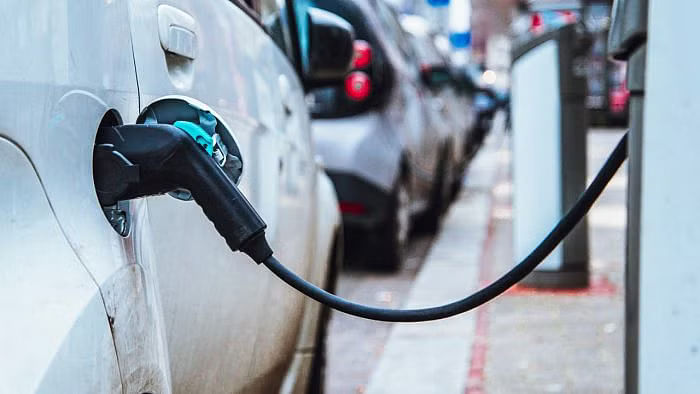
Representative image of EV charging.
Credit: iStock Photo
More developers in India are putting electric vehicle chargers in parking slots of new developments, hoping to boost the value of the property and attract more buyers in a country where the charging infrastructure can't keep up with soaring EV sales.
While EVs accounted for just 2.4 per cent of India's vehicle sales in the first half of this year, EV sales grew 137 per cent to 48,000 units during the same period, research firm Canalys says.
The world's most populous nation is aiming to make EVs account for a third of total vehicle sales by 2030, but scarcity of public charging stations could derail these ambitions.
Currently, there are 435 EVs for every public charging station nationwide, according to power ministry data, in contrast to the United States, which has 26 EVs per charger, data from the Alliance for Automotive Innovation shows.
For now, property developers including Sobha, and property management firm Prestige, are using this shortage to their advantage, betting that EV chargers in residential properties will make clients pay a premium for units like swimming pools used to in the past.
"People considering purchasing EVs want assurance that they will have access to charging facilities within the residential complex," said Javed Shafiq Rao, senior vice president and head of property management at Prestige, which is investing more in properties with EV chargers.
Sobha has gone a step further and launched two residential projects in Bengaluru with EV charging facilities in all available parking slots.
Other developers betting on the trend include Mahindra Lifespace, Kolte-Patil, Brigade and DLF.
To be sure, Indian authorities are encouraging installation of charging infrastructure, and each state has its own guidelines: Delhi, for example, requires 20 per cent of parking spots to be reserved for EVs, while Uttar Pradesh, which has the most EV registrations, mandates all new housing complexes above 5,000 square metres to have at least one EV charging unit.
"No matter how fast public charging is, you need to go there, stop there to get the charging done, while in home-charging, you plug it in and your EV is fully charged overnight," said Ravneet Phokela, Chief Business Officer of energy firm Ather Energy.
India is expected to see sales of more than 10 million EVs a year by 2030, rising more than ten folds from last fiscal year, according to the recent annual Economic Survey.